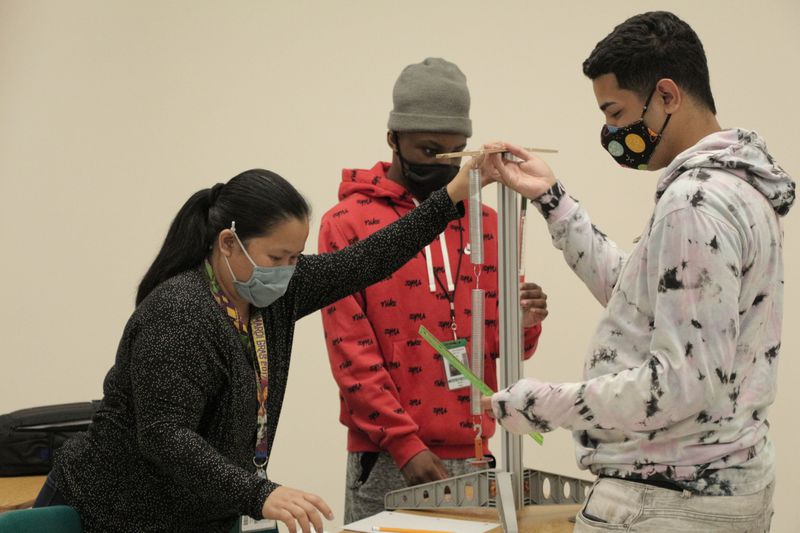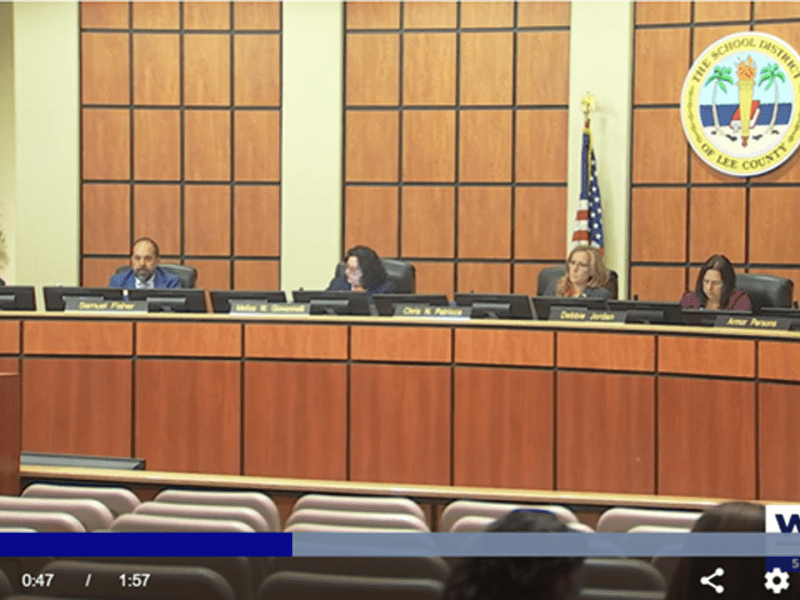6 years ago, no one at Jones High took physics; enrollment has surged to 250 today
Orlando Sentinel | by Leslie Postal | May 11, 2021
Je’ Nyia Burton worried when she learned she’d been enrolled in physics for her senior year at Jones High School.
“It looks like a lot of math,” she thought unhappily, fearing a bad grade.
But now, as the school year winds down, the 18-year-old would tell younger students not to fret when they see physics on their schedules.
“You’re going to like physics because I liked it,” she said. “If you keep asking questions, you’re going to get it.”
Physics, which wasn’t offered at Jones six years ago, has had a resurgence on the Orlando school’s campus, with most seniors now taking the class considered a key foundation for the so-called STEM fields of science, technology, engineering and mathematics.
This year, more than 250 students at Jones — Orlando’s historically Black high school — are in a physics class. That means physics enrollment at the Orange County school district’s smallest traditional high school now tops that at most of its 20 high schools, according to Paul Cottle, a physics professor at Florida State University.
Only Timber Creek, Windermere and Winter Park high schools have more physics students this year than Jones does, Cottle found in his annual review of physics enrollments in Florida’s public high schools.

In 2015, no one at Jones High School was taking physics, as there was no physics teacher and no physics classes. That worried Cottle and Jim Gates, Jones’ 1969 valedictorian and a physicist now working at Brown University in Rhode Island.
Both said high schools need to give their students a chance to take physics because in college the course is often required for majors in biology, computer science, engineering and health sciences, among others.
Those who arrive in college without a high school physics course often struggle to master the material and can then find their plans for a college major, and a career, derailed. In his first-year physics courses at FSU, students who did not take physics in high school typically earn a full letter grade lower than those who did, Cottle said.
Gates, president of the American Physical Society and a 2013 winner of the National Medal of Science, said it is nationwide problem that not enough high school students take physics or upper-level math classes, though so many good-paying jobs are now tied to those fields.
“This is a concern I have for kids everywhere in the United States,” said Gates, who served on President Barak Obama’s Council of Advisors on Science and Technology. “That message just seems to have a difficult time getting out there.”
But Gates, who since 2004 has given annual awards to top math and science students at his alma mater, said it was “wonderful” that Jones again has made the study of matter and energy a priority.
He attended Jones when the county’s schools were segregated, but it offered him an “amazing” physics teacher who spurred his interest and his success, he said.
In Florida, physics enrollment in high schools has fallen since 2014, said Cottle, who works to improve K-12 science education and writes on the topic on his Bridge to Tomorrow blog. But both the Seminole and Orange school districts have bucked that worrisome and “generally dismal” trend, he wrote.
Seminole for years has been the Florida leader in physics enrollment and remained on top this school year, he said, while Orange made significant increases, fueled by gains at Jones but also at Apopka, Evans, Freedom, Ocoee and Winter Park high schools.
For Jones Principal Allison Kirby, the first step to boosting physics enrollment was finding someone to teach the class. That was not easy. State-certified physics teachers are a “critical shortage area” in Florida.
But an international exchange program helped Kirby hire Sharon Agawin from the Philippines four years ago. Agawin has proved to be an engaging and talented teacher, Kirby said, and is a self-proclaimed “physics advocate” eager to convince students they can and should tackle the class.
“Physics gives us the rules to the game of the universe,” Agawin said. “Nothing wonderful is easy, that includes physics.”
Initially, Agawin taught physics just two periods a day and then taught math for the rest. She talked up physics to her math students and, when possible, had her physics classes do experiments outside “to kind of advertise it” to other students.

Kirby eventually decided to make physics the default senior year science class and found another teacher to teach the class, too. “I don’t have people asking to get out,” she said.
The principal tells students physics can be fun, will look good on their transcripts when they apply to colleges and makes sense for anyone with a STEM interest. Most, like Je ‘Nyia, are nervous that physics is so tied to math but, in the end, they manage.
“Everybody got comfortable,” Je ‘Nyia said. “We ask questions. We ask each other questions. We just have that bond with the teacher now.”
“You just need to know formulas,” said Kendersley Marcellin, another senior. “It’s not that bad. Formulas are your best friend.”
Kendersley, who plans to study biology at Benedict College, and Je ‘Nyia, who is weighing college offers and hopes for a medical career, both won Gates’ $1,000 award this year.
Gates, who earned both physics and mathematics degrees at the Massachusetts of Institute of Technology, said there is no getting around the math. “Mathematics is to physics as language is to literature,” he said.
But like learning to ride a bike or to play the piano, math gets easier with practice. During a recent online ceremony in which he presented his awards, Gates told Jones students that studying math and physics had given him professional and economic success.
“Spending time in school is a way to make sure you’re not ignored in the future,” he said.
Featured image: Teacher Sharon Agawin works with physics students at Jones High School. – Original Credit: Jonathan Noel/Jones High School (Courtesy photo)






